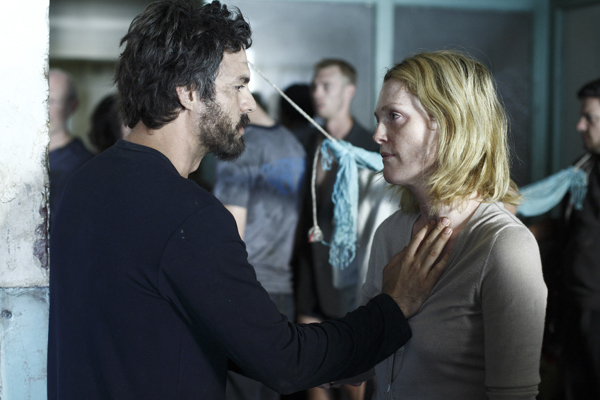Blindness
Clairvoyant Hands
Starring: Julianne Moore, Mark Ruffalo
By Robert Patrick
Fernando Meirelles, displaying his acute fearlessness for moviemaking, gives us his most artistically provocative film to date with this year’s Blindness. Adapted from the universally heralded novel of the same name by Jose Saramago, Blindness is not only the most theatrically challenging picture of the year, but also one of the best. Some, most of whom will not be open to Meirelles’ seemingly marred interpretation of humanity, will find this film beyond reproach. Others, enabling themselves to sift within the difficult subject matter, will discover a kind hearted film, full of moments that knife through the filth and decay to reveal chasms of beauty and magic – something that is somewhat of a rarity in today’s cinema.
Blindness, like the title implies, sees its characters witness to an epidemic of complete vision loss. A young man on the freeway, one of the first people to encounter this inexplicable viral disease, employs an optometrist in an effort to diagnose the irregular symptoms. “It’s like swimming through milk,” the infected says, describing the anomaly. The eye doctor (Mark Ruffalo), confused by the lack of traditional complications seen in cases of blindness, surmises that the young man’s disease is something too remote to fix himself. Soon, everyone that the young man came in contact with becomes plagued by the phantom illness – his wife, a pedestrian, and even the doctor fall victim. In fact, much of the city soon finds itself in the clutches of this peculiar virus. Much like another neurological thriller from this year, The Happening, there is pretty much no stopping the catastrophic, unexplained sickness.
The government, in an effort to quarantine the contaminated citizens, herd them into a large, abandoned hospital. Without proper medical supervision, toiletries, or even the barest of amenities, the infected are forced into reprehensible conditions, and utterly void of help from the outside world. Military enforcers, standing guard around the premises of the destitute building, keep the sickly group within the confines of their rooms. The doctor, feeling the need for a chain of command , tries to keep a flimsy democracy afloat within the unkempt quarters. Lucky for him, and unbeknownst to the others, his wife (Julianne Moore), who had snuck into the facility with the rest of the blind, can see perfectly – for an unexplained reason, she has a natural immunity to the disease. Attempting to keep it a secret, she assists the helpless inhabitants through primitive living conditions. Eventually, after an undetermined passage of time, the hospital becomes a virtual cesspool. Unable to supervise everyone, the cots become soiled, the people malnourished, and the spirits downtrodden.
As coarse as the hospital already is, the gradual incline of the infected populous skyrockets, leaving an even more unstable juxtaposition of civility and anarchism. In the middle of this constant dystopia, a benefactor arises from the ashes, splintering the wards into rivaling factions. The monarch, known only as “King of Ward Three” (Gael Garcia Bernal), raises a self-appointed committee to oversee ration distribution. The other wards must deal away their belongings, their women, and their self respect in order to eat, so says the feigned leadership.
The movie, hardly thematic in standard senses, presents itself without serpentine plot devices. The doctor’s wife, unwavering in her weary solicitousness, carries the weight of a flock on her buckling shoulders. She is a shepherd, providing the only semblance of humanity in an otherwise insane world. Meirelles, preventing himself from lionizing people, the situation, or even nature itself, does away with any easy solutions. That is the challenge with Blindness: you have to be at peace with yourself to watch this film. There isn’t an ounce of brevity in these difficult and lengthy sequences of anguish, loss, and regret. The genius of Meirelles – and there is a lot of it – is the way he tests the faith of his audience: Why am I uncomfortable right now? Why do I feel subservient to this collective thought? Why am I so engaged? I am certainly not trying to canonize Meirelles, but at times, I did feel this movie as a religious awakening.
The importance of Blindness lies not only in its acting and set design, but also in the eye of its director. There are outstretched hands piercing through light, cream colored transition shots, and walls of empathetic images that are about as important as they get in cinema.
Blindness may be discussed at great length over its lack of commercial appeal, the graphic nature of its content, and the general intentions of its director. No matter, all of these things are at least important to conversation, and isn’t that what real art is about anyway?
4/5

